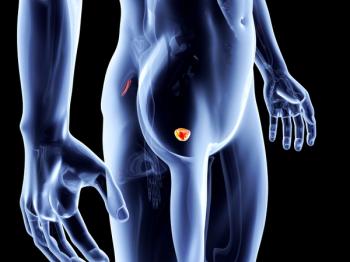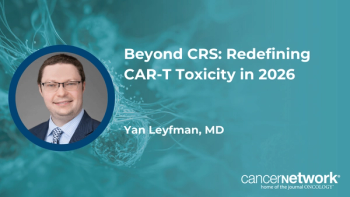
Guidelines Validated for Anticoagulant Dose Reductions in Thrombocytopenia
A new study validates therapeutic guidelines that recommend anticoagulant dose reductions for thrombocytopenia in cancer patients.
A new study validates therapeutic guidelines that suggest anticoagulant dose reductions for thrombocytopenia in cancer patients.
Thrombocytopenia is a common adverse event associated with chemotherapy. “In cancer patients, the need for therapeutic anticoagulation often is concurrent with thrombocytopenia from chemotherapy, or other reasons,” said lead author Gerald A. Soff, MD, of Memorial Sloan Kettering Cancer Center (MSKCC) in New York.
Dr. Soff presented the results at the 57th Annual American Society of Hematology (ASH) Meeting and Exposition, held December 5–8 in Orlando, Florida (
The current standard of care for preventing blood clots in a cancer setting includes treatment with the anticoagulant low-molecular-weight heparin (LMWH). However, there is limited evidence to support proper dosing to treat these episodes in the setting of chemotherapy-induced thrombocytopenia. In 2010, MSKCC researchers implemented guidelines for LMWH dose modifications in the setting of thrombocytopenia.
The guidelines call for a full dose of enoxaparin for the treatment of cancer-associated venous thromboembolism when a patient’s platelet count is more than 50,000/mcL, a half dose when the platelet count is between 25,000/mcL and 50,000/mcL, and to hold therapy temporarily when the platelet count is less than 25,000/mcL.
To evaluate the safety and efficacy of these guidelines, Dr. Soff and colleagues conducted a retrospective analysis to evaluate the outcomes of cancer patients who were thrombocytopenic for at least 7 days and received a therapeutic dose of LMWH from 2011 to 2013.
They identified 102 patients with a collective 143 episodes of thrombocytopenia. Chemotherapy was the cause of thrombocytopenia in 79% of the patients.
The LMWH dose was modified in 136 of 144 episodes (95%), which showed adherence to the institutional guidelines, he said.
LMWH doses were reduced in 20 episodes, withheld in 89 episodes, and managed with a combination of reduction or withheld in 27 episodes. In general, the more severe thrombocytopenic episodes were managed by withholding LMWH, as opposed to dose reductions.
“During anticoagulant modification per the guidelines, there were no recurrent venous thromboembolism episodes (less than 1%) and no major bleeds (less than 1%),” Dr. Soff said. There was one major bleed before dose reduction of LMWH.
The data support the safety and efficacy of following the MSKCC guidelines for therapeutic LMWH dose modification, balancing the dual risks of recurrent thrombosis and potential bleeding during periods of chemotherapy-induced thrombocytopenia in cancer patients. “It was gratifying to see the safety results,” he said. “This is the first validation of the guidelines. We think it will have an impact on clinical practice around the world.”
In conclusion, Dr. Soff said: “This quality assessment initiative supports 95% adherence to the institutional guidelines and demonstrates the safety and efficacy of the MSKCC guidelines.” He noted that many institutions use similar guidelines for therapeutic LMWH dose modification in the setting of chemotherapy-induced thrombocytopenia.
“We need to educate practitioners about the guidelines,” he said, noting that the guidelines cannot be extrapolated to the direct oral anticoagulants, or other anticoagulants.
Newsletter
Stay up to date on recent advances in the multidisciplinary approach to cancer.
















































